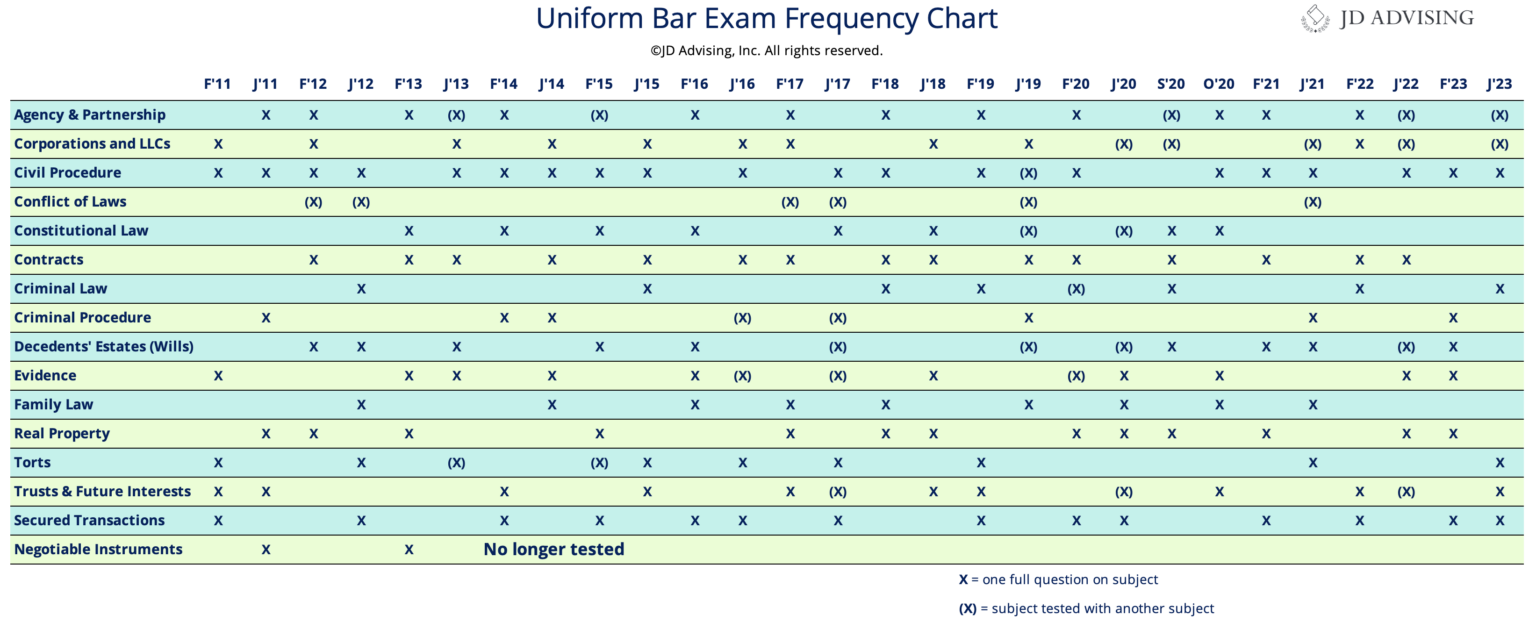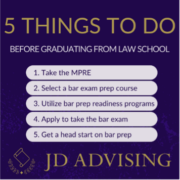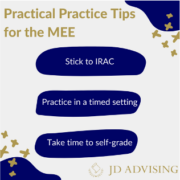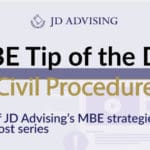What Are The Uniform Bar Exam Topics?
What Are The Uniform Bar Exam Topics?
The Uniform Bar Exam (UBE) is a unique bar exam that is rapidly taking over the country. Despite its popularity, you probably only learned this when you were deciding what bar exam to take after you finish law school. Now that you are ready to begin your bar exam study journey, you need to know the Uniform Bar Exam topics. If you are a law student ahead of the game and want to know what courses you should take to prepare you best for a UBE bar exam, this post is also for you.
What Are The Uniform Bar Exam Topics?
General Overview of the Uniform Bar Exam
The Uniform Bar Exam is a bar exam created by the National Conference of Bar Examiners (NCBE) and but it is administered, graded, and scored by individual jurisdictions. It provides a portable score that can be transferred to other UBE jurisdictions if it is considered to be a passing score by that jurisdiction.
The UBE tests general legal principles and skills, not state-specific law. It consists of the Multistate Bar Examination (MBE) and a written portion made up of the Multistate Essay Examination (MEE) and the Multistate Performance Test (MPT). The MPT does not test specific legal topics but rather lawyering skills. Below, we will give you an overview of each part of the test, along with which topics are tested in each portion.
Multistate Bar Examination
According to NCBE, the purpose of the MBE is to test applicants on their ability to “apply fundamental legal principles and legal reasoning to analyze given fact patterns.” The MBE consists of 200 multiple choice questions administered over a span of six hours, which are divided into two three-hour morning and afternoon sessions. Out of the 200 questions, 175 are scored and 25 are unscored “pretest questions.” No points are deducted for wrong answers, so if you find yourself running out of time be sure fill in an answer to as many questions as you can.
The MBE tests the following seven subjects:
- Contracts and Sales
- Constitutional Law
- Criminal Law and Procedure
- Civil Procedure
- Evidence
- Real Property
- Torts
All subjects are equally tested for there will be 25 questions for each subject. The 25 remaining questions are the “pretest” questions.
Multistate Essay Examination
The MEE consists of six essays administered over three hours. So you will want to be sure to allow yourself only 30 minutes per essay. The NCBE prepares these six essay questions.
The NCBE lists the following subjects as potential subjects covered on the MEE:
- Business Associations (Agency and Partnership; Corporations and Limited Liability Companies)
- Civil Procedure
- Conflict of Laws
- Constitutional Law
- Contracts
- Criminal Law and Procedure
- Evidence
- Family Law
- Real Property
- Torts
- Trusts and Estates (Decedents Estates; Trusts and Future Interests)
- Uniform Commercial Code (Secured Transactions)
In the past, the NCBE released seven to nine essay questions that jurisdictions administering the MEE could choose from. But as of February 2014, the NCBE only wrote and provided six MEE essays so jurisdictions no longer got to pick and choose what questions to test on. If you are in a MEE jurisdiction, please see this post about the subjects that are frequently tested on the Multistate Essay Exam.
Decoding the chart above
The data below and in the above chart comes from the bar exams from 2011 to the most recent bar exam. The single most highly tested subject on the essay portion of the Uniform Bar Exam is Civil Procedure. We’ve also divided up the subjects so you can see the most highly tested to least-tested subjects. (You can see the most recent Multistate Essay Exam frequency chart here.)
Tier One: Highly Tested Subjects on the Uniform Bar Exam (In Order of Most-to-Least Tested)
- Civil Procedure (20 full essays plus 1 combined with another subject)
- Agency and Partnership (12 full essays plus 5 combined with another subject)
- Contracts (15 full essays)
- Secured Transactions (14 full essays)
- Real Property (13 full essays)
- Corporations and LLCs (10 full essays plus 5 combined with another subject)
- Evidence (10 full essays plus 3 combined with another subject)
- Trusts and Future Interests (10 full essays plus 3 combined with another subject)
- Decedents’ Estates (Wills) (9 full essays plus 4 combined with another subject)
- Constitutional Law (8 full essays plus 2 combined with another subject)
- Torts (8 full essays plus 3 combined with another subject)
- Family Law (9 full essays)
Tier Two: Lesser-Tested Subjects on the Uniform Bar Exam (In Order of Most-to-Least Tested)
- Criminal Procedure (7 full essays plus 2 combined with another subject)
- Criminal Law (6 full essays plus 1 combined with another subject)
- Conflict of Laws (This is usually combined with Decedents’ Estates, Family Law, Civil Procedure, or Corporations/LLCs. It is not tested on its own.) (0 full essays, 6 essays combined with another subject)
Some notes to keep in mind
- Sometimes the NCBE labels a subject “Criminal Law and Procedure” when it only covers just one of those topics. We listed the true amount of times those subjects were tested above.
- 2011 is when the first Uniform Bar Exam was administered.
Feel free to download the UBE chart (or email us at info@jdadvising.com if you are having difficulty downloading it!) If you repost it somewhere on the internet, we would appreciate a link to this site. Thank you!
Multistate Performance Test (MPT)
The MPT is a lawyerly task. You will be expected to complete, for example, a memorandum to a supervising attorney, a letter to a client, a persuasive memorandum or brief, a statement of facts, a contract provision, a will, a settlement proposal, a discovery plan, a witness examination plan, a counseling plan, or a closing argument. The MPT does not test any law! So there are really no Uniform Bar Exam topics that you have to know for the MPT.
Here is a brief overview of the MPT.
The MPT has two parts: (1) a file, and (2) a library.
The file contains:
- A task memo: This tells you what you are supposed to do. It is important to pay attention to directions! Many students lose points simply because they do not pay attention! The task memo will reveal the kind of document you are supposed to write, who your audience is, the tone of the document (i.e. whether it is supposed to be persuasive or objective), and any specific issues that need to be addressed.
- Factual documents: These include transcripts of depositions or interviews, court pleadings, discovery documents, etc. Just like in “real life”, not every single document will be important. Note also, that some documents are ambiguous, incomplete, or conflicting, just like in real life.
The library contains: the law. This includes cases, statutes, rules, regulations, etc. Some of the law may be relevant; some may not be! Remember that even if you think you know the law, they may have changed it for the purpose of the MPT. Never assume you know what the library says! Read everything in the library, including the footnotes.
Looking to Pass the Bar Exam?
Free Resources:
- 🌟Bar Exam Free Resource Center: Access our most popular free guides, webinars, and resources to set you on the path to success.
- Free Bar Exam Guides: Expert advice on the MBE, the MEE, passing strategies, and overcoming failure.
- Free Webinars: Get insight from top bar exam experts to ace your preparation.
Paid Resources:
- 🏆One-Sheets: Our most popular product! Master the Bar Exam with these five-star rated essentials.
- Bar Exam Outlines: Our comprehensive and condensed bar exam outlines present key information in an organized, easy-to-digest layout.
- Exclusive Mastery Classes: Dive deep into highly tested areas of the MBE, MEE, MPT, and CA bar exams in these live, one-time events.
- Specialized Private Tutoring: With years of experience under our belt, our experts provide personalized guidance to ensure you excel.
- Bar Exam Courses: On Demand and Premium options tailored to your needs.
- Bar Exam Crash Course + Mini Outlines: A great review of the topics you need to know!
🔥 NEW! Check out our Repeat Taker Bar Exam Course and our new premier Guarantee Pass Program!






